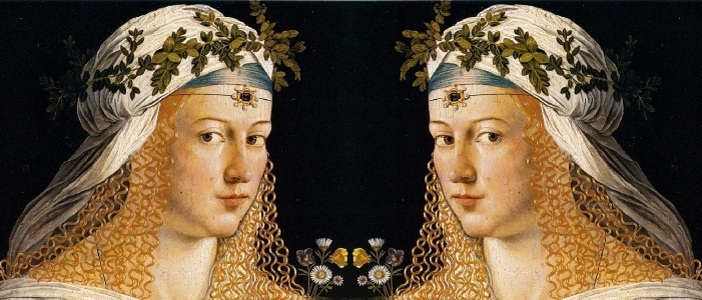Lucrezia Borgia
Posted on 6th January 2021
Lucrezia Borgia was born into a family known for their political corruption, violence and debauchery, but where did she fit into this and is her reputation deserved?
Lucrezia Borgia was born on 18 April 1480 at Subiaco, Rome, the illegitimate daughter of Cardinal Rodrigo Borgia (later Pope Alexander VI) and his mistress Vannozza dei Cattanei.
Although it was normal for daughters to be educated at a convent, Lucrezia was educated at court by close relatives and intellectual friends. She was taught Spanish, Italian, French, Latin and Greek as well as music and poetry.
Like her siblings, Lucrezia was to be used politically in marriage to secure support for her father.
In her early life, Lucrezia was promised in marriage on two occasions to Spanish noblemen, however both these betrothals were broken. When her father became Pope in August 1492, he was looking for more powerful alliances to support the family and within a year on 12 June 1493 Lucrezia was married to Giovanni Sforza, Lord of Pesaro, member of the Sforza family of Milan, one of the most powerful families in Italy.
Lucrezia was not happy in this marriage, and when the alliance with the Sforza family was no longer needed, the pope began arrangements to have the marriage annulled on the grounds of non-consummation. Although Sforza denied this, he was pressured into agreeing to the annulment which was finalised on 27 December 1497.
It is believed that Lucrezia, who had retired to a convent while waiting for the decision of the annulment, was already pregnant, however it is understood that her husband was not the father. The child, a boy named Giovanni was not seen publicly for three years, and no confirmation was ever given that the child was Lucrezia’s. The Pope issued a decree to say the child was Cesare’s by an unknown woman, and on another occasion, he released a decree to say the child was indeed his own.
To strengthen the Pope’s ties with Naples, Lucrezia was now married to Alfonso of Aragon, Duke of Bisceglie in July 1498. Lucrezia was now given the governorship of Spoleto (ancient city in Perugia, Umbria) in 1499, making Alfonso feel like a consort only.
It did not take long for Pope Alexander to prefer an alliance with France rather than Naples, so Lucrezia’s marriage was of no further use. Alfonso now believing he was in danger, fled Rome, only to return at Lucrezia’s request. After his return, Lucrezia gave birth to their only child, a son she named Rodrigo after her father.
In July 1500, Alfonso survived an assassination attempt even though he had been repeatedly stabbed. Lucrezia cared for her husband following the attack, however one month later in August 1500, Alfonso was strangled to death, it is believed on the orders of Lucrezia’s brother Cesare Borgia.
Lucrezia was devastated by the death of her husband and yet less than two years later she married again for the third time to Alfonso l d’Este, Duke of Ferrara in 1502.
This was again a political marriage arranged by her father, and yet Pope Alexander did not have time to cement his political alliances, dying in August 1503, probably of Malaria, although there is speculation that he may have been poisoned.
Lucrezia’s marriage was believed a happy one, although not faithful on either side. She gave birth to at least eight children, though only four reached adulthood.
Living in Ferrara, she was adored by the people, who believed her graceful and respectable. She also became a great lover of the arts. Maybe living far away from Rome gave her the stability she needed without the manipulation of the Borgia family.
On 14 June 1519 Lucrezia gave birth to a daughter Isabella Maria, who died. She was weak and became seriously ill following the birth. She died on 24 June 1519, aged thirty-nine and is buried in the Convent of Corpus Domini in Ferrara.
Lucrezia Borgia lived through a ruthless, corrupt and debauched time with a family that would do anything without conscience to meet its desired conclusion. Was she a willing participant in their scandalous schemes or just a pawn for them to use for their own gain?
We will never know, but she leaves us a legacy where she has been accused of scandalous behaviour including being a poisoner, a murderer and having relations with both her father and her brother Cesare.
Tagged as: Junior Middle Ages
Share this post:





